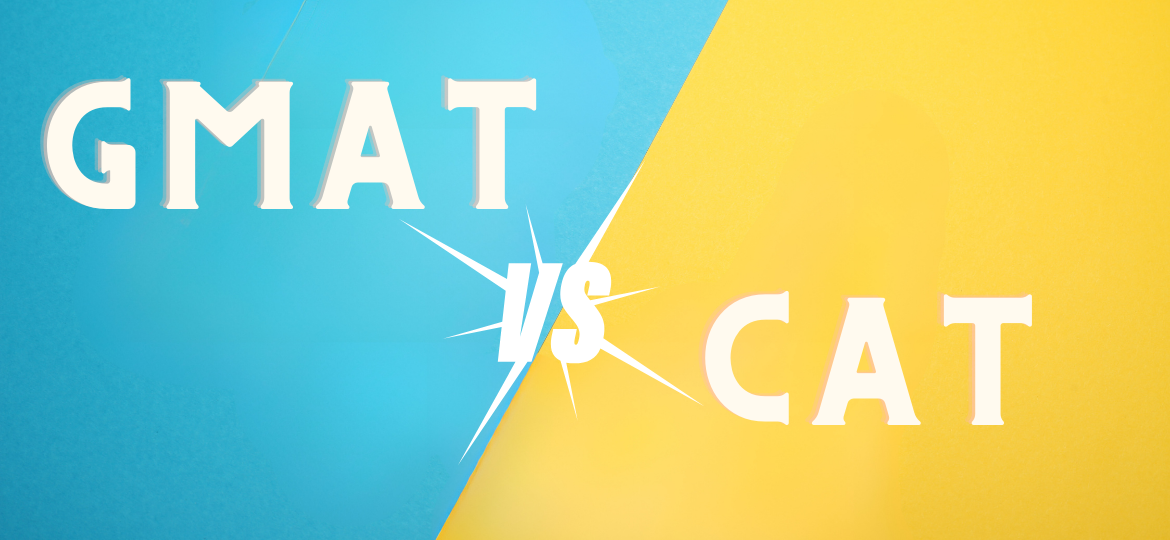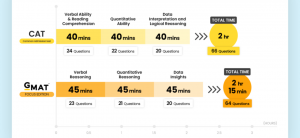


Introduction of GMAT vs CAT
If you’re considering pursuing a management degree, you’ve likely come across two popular exams: the Graduate Management Admission Test (GMAT) and the Common Admission Test (CAT). Both tests are essential for gaining admission to prestigious business schools, but which one is the best choice for you in 2024?
This brief comparison highlights some of the key differences between GMAT vs CAT.
| Aspect | GMAT | CAT |
|---|---|---|
| Administered By | The Graduate Management Admission Council (GMAC) | Indian Institutes of Management (IIM) |
| Test Mode | Offline and Online | Online |
| Duration | 3 hours 7 minutes (Old Version) | 2 hours |
| 2 hours and 15 minutes (New Version) | ||
| Application Fee | INR 22,824 ($275) Offline | INR 2,400 (General) |
| INR 24,899 ($300) Online | INR 1,200 (Under reservation) |
GMAT Overview
The GMAT (Graduate Management Admission Test) is a standardized test designed to assess certain analytical, writing, quantitative, verbal, and reading skills in written English for use in admission to a graduate management program, such as an MBA. It consists of four main sections: Analytical Writing Assessment, Integrated Reasoning, Quantitative Reasoning, and Verbal Reasoning.
Here are the key highlights of GMAT presented in a table format:
| Aspect | Details |
|---|---|
| Test Name | Graduate Management Admission Test (GMAT) |
| Sections |
|
| Test Format | Computer-adaptive test |
| Scoring Range | 200 to 800 points |
| Test Duration | Approximately 3 hours and 7 minutes (including breaks) |
| Registration Fee | Around $250 (subject to change) |
| Accepted By | Over 7,000 programs at more than 2,300 universities worldwide |
| Test Frequency | Available year-round with flexible test dates |
| Validity | Scores valid for up to 5 years |
| Preparation | Official study materials, online courses, practice tests, coaching programs |
| Test Centers | Numerous test centers worldwide |
| Adaptive Format | Questions adapt based on the test-taker’s performance |
| Average Score | Around 550 points |
| Percentile Rank | Indicates performance compared to other test-takers |
| Eligibility | Suitable for those aspiring to pursue management education globally |
| Pros | Globally recognized, accepted by a wide range of programs, flexible test dates |
| Cons | Expensive, challenging for non-native English speakers |

Read More: Best MBA Colleges in the World 2021 – Study Abroad
CAT Overview
The CAT (Common Admission Test) is a computer-based test for admission into various management programs offered by Indian Institutes of Management (IIMs) and other prestigious institutions across India. It consists of three sections: Verbal Ability and Reading Comprehension, Data Interpretation and Logical Reasoning, and Quantitative Ability.
Here are the key highlights of CAT presented in a table format:
| Aspect | Details |
|---|---|
| Test Name | Common Admission Test (CAT) |
| Sections |
|
| Test Format | Computer-based test |
| Scoring Range | 0 to 300 points |
| Test Duration | 2 hours and 40 minutes |
| Registration Fee | Around ₹2,000 for Indian candidates (varies for international candidates) |
| Accepted By | Indian Institutes of Management (IIMs) and various other management institutes in India |
| Test Frequency | Conducted once a year |
| Validity | Scores valid for one year |
| Preparation | Mock tests, study material, online courses, coaching classes |
| Test Centers | Numerous test centers across India |
| Format | Fixed format with predetermined number of questions in each section |
| Difficulty Level | Highly competitive, challenging syllabus |
| Top Score | Typically above 99 percentile |
| Eligibility | Suitable for candidates aiming for admission to Indian management institutes, especially the IIMs |
| Pros | Accepted by top Indian institutes, lower cost compared to GMAT, specific to Indian management education |
| Cons | Limited to Indian schools, highly competitive, challenging syllabus |
Top Universities Worldwide Accepting GMAT Scores
GMAT is widely recognized as one of the most preferred entrance examinations for business schools globally. Many prestigious universities worldwide require GMAT scores to assess the aptitude and skills of applicants seeking admission to their graduate programs.
| University | Location | GMAT Score Range |
|---|---|---|
| Harvard Business School | USA | 730-790 |
| Stanford Graduate School of Business | USA | 720-780 |
| The Wharton School, University of Pennsylvania | USA | 730-780 |
| INSEAD | France/Singapore | 690-750 |
| London Business School | UK | 690-750 |
| MIT Sloan School of Management | USA | 700-760 |
| Columbia Business School | USA | 710-770 |
| HEC Paris | France | 690-760 |
| Kellogg School of Management, Northwestern University | USA | 700-760 |
| Chicago Booth School of Business | USA | 720-780 |
| IE Business School | Spain | 680-740 |
| Yale School of Management | USA | 690-750 |
| Said Business School, University of Oxford | UK | 690-750 |
| NYU Stern School of Business | USA | 700-760 |
| Rotterdam School of Management, Erasmus University | Netherlands | 670-730 |
These universities, among others, utilize GMAT scores as a standard metric to evaluate candidates’ suitability for their graduate degree programs.
Top Universities Worldwide Accepting CAT Scores
CAT, primarily used for admission to Indian business schools, is gaining recognition globally. Some prestigious universities outside India also accept CAT scores as part of their admission process for management programs.
| University | Location | CAT Score Range |
|---|---|---|
| London Business School | UK | 90-99 percentile |
| HEC Paris | France | 85-95 percentile |
| INSEAD | France/Singapore | 90-99 percentile |
| Said Business School, University of Oxford | UK | 85-95 percentile |
| Cambridge Judge Business School | UK | 85-95 percentile |
| IE Business School | Spain | 80-90 percentile |
| ESADE Business School | Spain | 80-90 percentile |
| IMD Business School | Switzerland | 85-95 percentile |
| Rotterdam School of Management, Erasmus University | Netherlands | 80-90 percentile |
| Manchester Business School | UK | 80-90 percentile |
| SDA Bocconi School of Management | Italy | 80-90 percentile |
| ESCP Business School | France/Germany/UK/Spain/Italy | 85-95 percentile |
| ESSEC Business School | France/Singapore | 80-90 percentile |
| University of St. Gallen | Switzerland | 85-95 percentile |
| Hult International Business School | USA/UK/Dubai/China | 80-90 percentile |
These universities, among others, recognize the CAT scores and consider them as part of their evaluation process for admission to their management programs.
Which Test to Choose: GMAT vs CAT?
Conclusion
In conclusion, both GMAT vs CAT have their own merits and drawbacks. Consider your educational and career goals, as well as the target schools, before making a decision.
FAQs
FAQ 1: Can I take both GMAT vs CAT?
Yes, you can take both exams if you’re open to pursuing management education in both India and abroad.
FAQ 2: Are GMAT vs CAT scores valid internationally?
GMAT scores are widely accepted globally, while CAT scores are primarily recognized by Indian business schools.
FAQ 3: Which exam is more difficult, GMAT or CAT?
Difficulty level varies based on individual strengths and weaknesses. However, GMAT is often considered more challenging due to its adaptive format.
FAQ 4: Can I switch from CAT to GMAT or vice versa?
Yes, you can switch exams based on your changing educational and career aspirations.
FAQ 5: How often can I retake GMAT or CAT?
You can retake both exams after a certain period, typically within a year.


